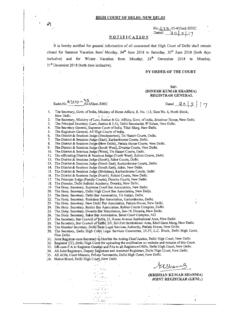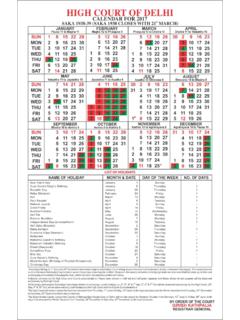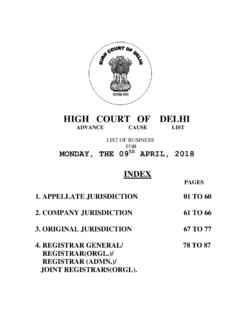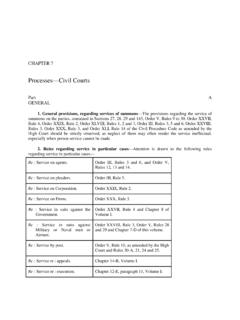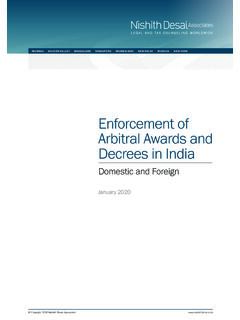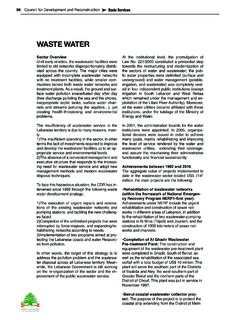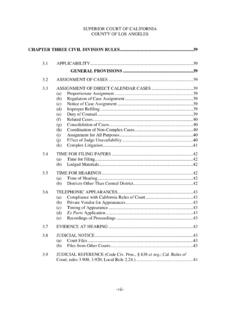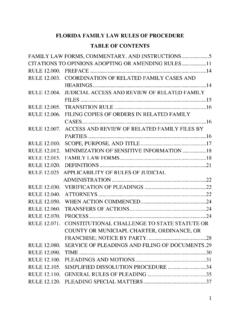Transcription of Ch. 12 Execution of Decrees - Delhi High Court
1 CHAPTER 12. Ch. 12. Execution of Decrees Part A]. Part A. GENERAL. 1. References The Law relating to Execution of Decrees is to be found in Sections 36 to 74, Sections 82 and 135; and Order XXI of the Code of Civil Procedure as amended by the Punjab High Court . These Provisions should be carefully studied and strictly followed. The changes introduced by the Punjab Relief of Indebtedness Act VII of 1934, and the Punjab Debtors Protection Act, II of 1936, also requires careful consideration. 2. Special day to be reserved for Execution work Execution of Decrees should receive the same attention from the Courts as original civil work and should be methodically and regularly dealt with, as expeditiously as possible.
2 Where parties have to be heard or evidence recorded in the course of Execution proceedings, notice should be given, processes issued and dates fixed as in the case of original suits. As a rule one day during the week should be reserved for Execution works so as to ensure proper attention being paid to it; some times two days are necessary. District Judges are responsible for seeing that proper arrangements are made for Execution work by all courts subordinate to them. 3. All orders to be recorded by the Judge in his own hand All orders passed in the Execution proceedings should be carefully and distinctly put on record in chronological order.
3 The practice of writing orders at the back of the talbanas or applications at stray places in the file leads to confusion and wastes the time of the Courts and the lawyers. The initial office report should be put up on a separate sheet of paper which may form the first page of the Judge s autograph and all orders except those of a formal nature should be recorded by the Presiding Officer with his own hand in a separate record of proceedings as in a civil suit. Every formal order also should be signed by the Presiding Officer. 4. Distribution of Execution work by District Judge District Judges should record standing orders regulating the distribution of applications for the Execution of Decrees among the Courts subordinate to them, providing for the disposal of cases in which Decrees were passed by officers who have ceased to be attached to the district, and for carrying on the Execution proceedings already pending before such officers at the time of their ceasing to be employed therein.
4 In framing such orders, every Court should be required as far as possible, to execute all Decrees passed by itself; but, where this is not possible and it is necessary to send the decree to another Court for Execution , care should be taken to see that it is a Court of competent jurisdiction [Section 39(2)]. Court shall demand to be a Court of Competent jurisdiction, if at the time of 1. making the application for the transfer of decree to it, such Court would have jurisdiction to try the suit in which such decree was passed [Section 39(3) added by Amending Act, 1976]. 5. District Judge to see that Execution work is not neglected in lower Courts Close supervision and control should be exercised by District Judges over the Execution of degree business pending in all Courts subordinate to them; and where any officer is found habitually to neglect this branch of work or to dispose of it in a perfunctory manner, he should be reported to the High Court .
5 6. Application for stay of Execution All applications for stay of Execution should be treated as urgent. 7. Presiding Officer to see that money realised on warrants has been accounted for To prevent defalcation, presiding officer should, while hearing Execution applications, verify by personal inspection of previous warrants issued by him that any money previously realised by the Execution bailiff or process server has been duly accounted for in the Nazir s accounts or otherwise disposed of through those accounts. Part B]. Part B. COURTS COMPETENT TO EXECUTE Decrees . 1. Courts competent to execute Section 37 of the Code of Civil Procedure define the Courts by which a decree may be executed.
6 A decree may be executed by, the Court to which passed it, or by any Court to which it is transferred for Execution . It should be noted that the expression Court which passed decree has been defined in Section 37 so as to include certain Courts other than Court which actually passed the decree . 2. Transfer of decree fees for preparation of unnecessary documents When a decree is transferred by the Court which passed it to another Court for Execution , the documents mentioned in Order XXI, Rule 6, must be sent to the latter Court . The work in connection with the preparation of these documents should be done by Court officials holding permanent appointments, on payment, in the first instance, by the person applying for the transfer of the decree of a fee of Re.
7 1. The amount so recovered shall be credited to Government under the head XXI-A Law and Justice Courts of Law General Fees, Fines, and Forfeitures Fees levied by Courts . A decree -holder, however, may at his option file with application a copy of his decree duly stamped in accordance with Article 7 of Schedule I, to the Court -fees Act, VII of 1870, and when he does so, he shall be exempted from the fee of Re. 1, prescribed in this paragraph, the remaining documents being prepared by the officials of the Court without further payment by the decree -holder. 3. Execution pending receipt of order of transfer of decree A provision has been made in Order XXI, Rule 10, Civil Procedure Code as amended by the Punjab High Court , to enable the decree -holder to apply for immediate Execution through the Court within whose jurisdiction the judgment-debtor is, by producing merely the decree and an affidavit of non-satisfaction pending the receipt of a formal order of transfer under Section 39, Civil Procedure Code.
8 4. Channel of transmission of decree transferred Where the Court to which a decree is to be sent for Execution is situate within the same district as the Court which passed the decree , the Court passing the decree , shall send the same directly to the former Court . But, where the former Court is situate in a different district the Court , which passed the decree , shall send it to the District Court of the district in which the decree is to be executed. (Order XXI, Rule 5 of the Code). 5. Execution of transferred Decrees Under Order XXI, Rule 8 of the Code of Civil Procedure, 1908, a decree sent under the provisions of Section 39 for Execution to another district may be executed either by the District Court to which it is sent, or by any Subordinate Court of competent jurisdiction to which the District Court may refer it, and, under Section 42, the Court executing the decree has the same powers of Execution as if the decree had been passed by itself.
9 The Execution files of such cases should remain with the record of the Court by which the decree is executed, and should not be returned to the Court by which the decree was passed. 6. Amount realised on transfer of Decrees to be certified and noted A certificate showing the extent to which the decree has been executed is required, by Section 41 of the Code of Civil Procedure, 1908 to be sent to the Court which passed the decree , as to Execution so certified, and the particulars should be entered in that Court s register of Civil suits under the head Return of Execution in order to prevent a double Execution being taken out in any other district.
10 7. Register of Decrees transferred and Decrees received by transfer To ensure compliance with order XXI, Rule 6 of the Code the High Court has prescribed a register in Form XXXIIII of part A-IV of High Court Rules and Order, Volume VI-A, Decrees transferred to other courts and those received by transfer are shown on the two sides of the same page in the register. Part C. POWERS OF EXECUTING COURTS. Part C]. 1. Mode of Execution Receivers The various modes in which Execution of a decree may be ordered are given in Section 51 of the Code as follows: (a) By delivery of any property specifically decreed;. (b) By attachment and sale, or by sale, without attachment of any property.


